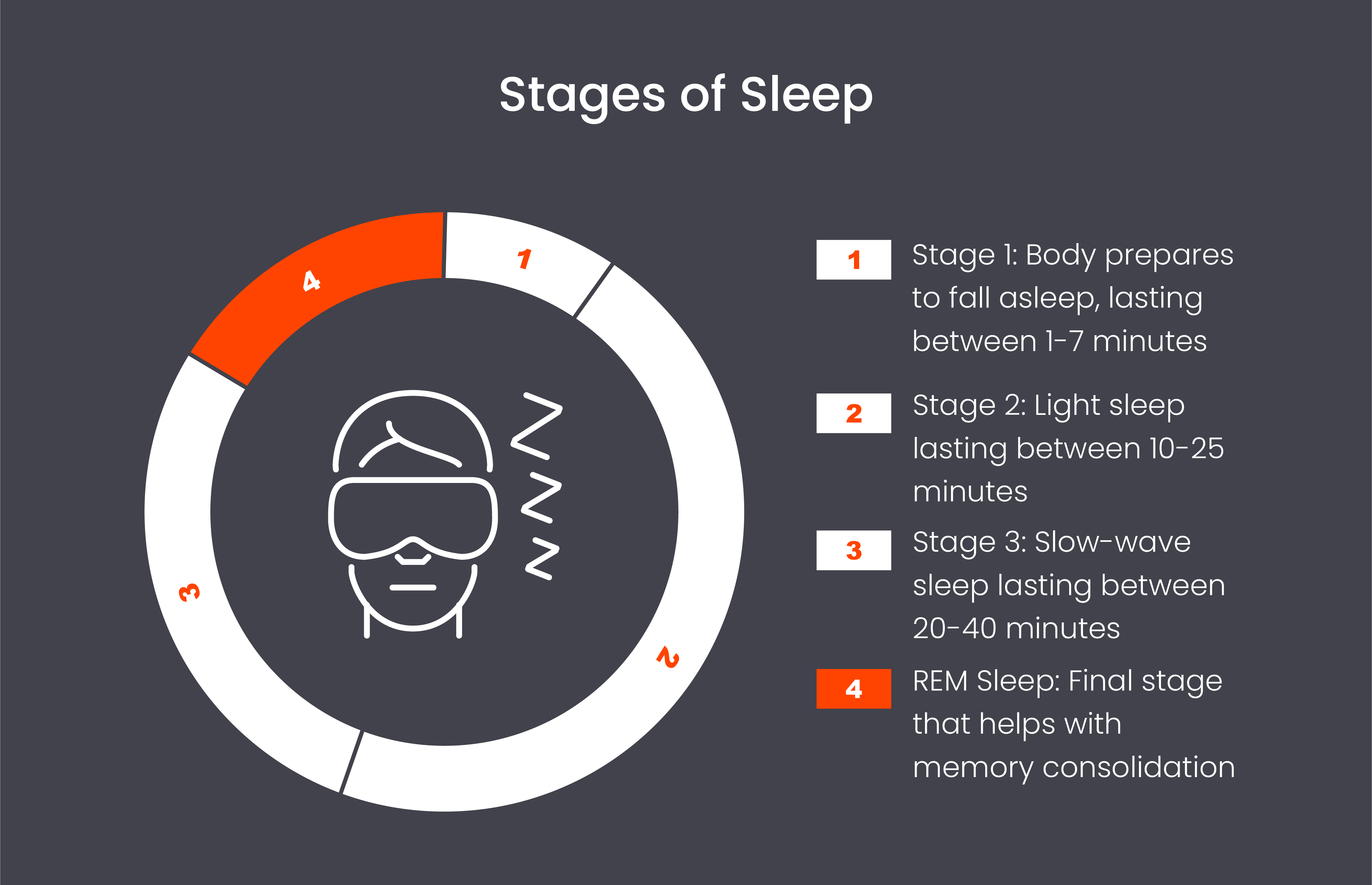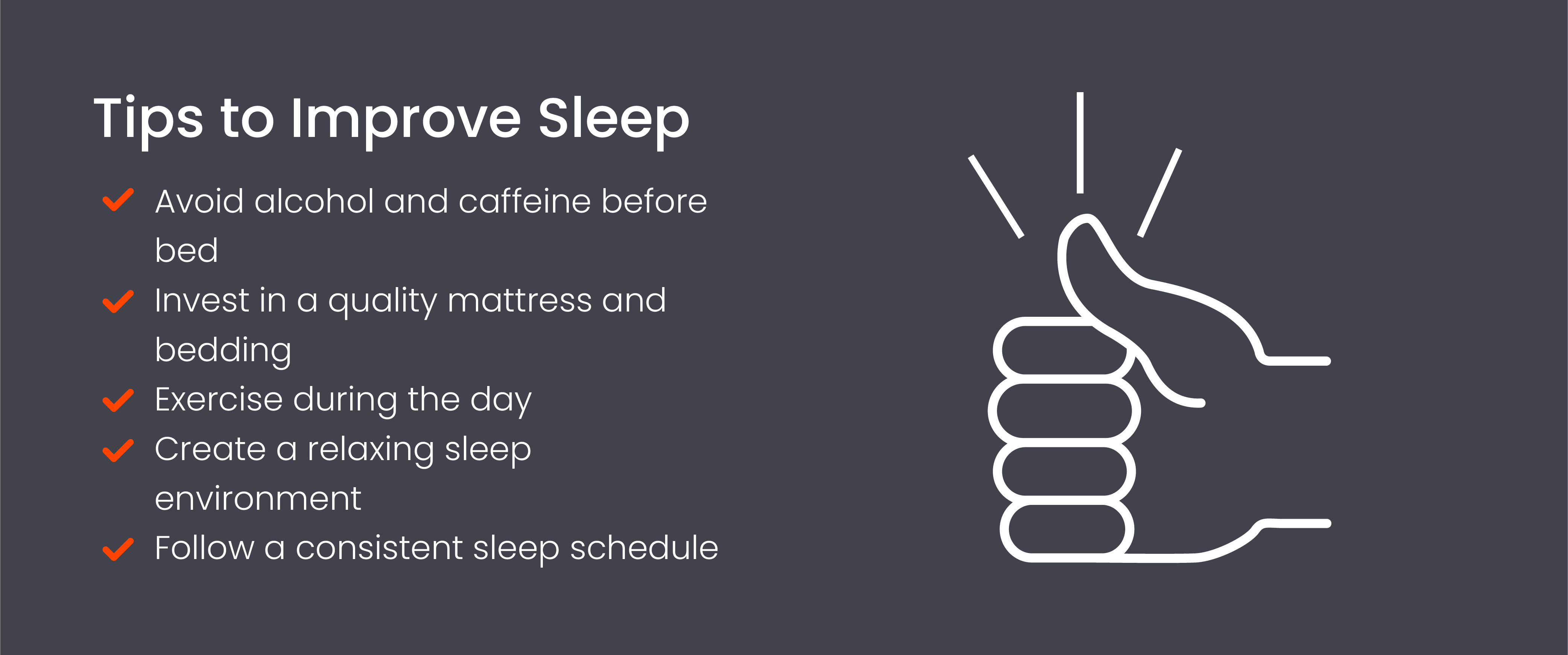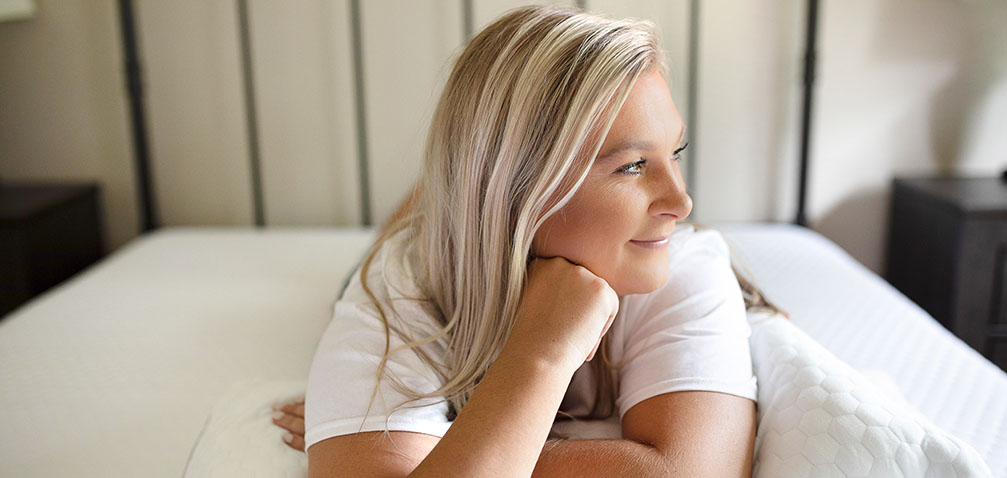- What Are the Stages of Sleep?
- How Does Alcohol Affect Your Sleep?
- When Should You Stop Drinking Alcohol Before Bed?
- Tips for Better Sleep
- Wrapping Up: Alcohol and Sleep
What Are the Stages of Sleep?
There are four stages of sleep, and alcohol can impact every one of them. So whether you drink right before bed and have difficulty falling asleep or wake up later in the night, alcohol might be the culprit. Understanding these four stages of sleep can help us better explain how alcohol impacts your sleep quality.

- Stage 1: During the initial sleep stage, you’re not quite asleep or awake, but your body will begin shutting down for the night as your heartbeat, breathing, and eye movements begin to slow. In this stage, you’ll enter light sleep, so sounds and light may be able to wake you easily.
- Stage 2: Stage 2 is the longest stage of sleep. During the second stage of sleep, your body continues its transition into shutting down as your heartbeat and breathing rate continue to slow, and you enter deeper sleep. Your body temperature will also decrease.
- Stage 3: In stage 3, your heartbeat, breathing, and brain activity are fully decreased, and your eye movements stop. Your body is completely relaxed, and you’re entering deeper sleep.
- REM Sleep: REM sleep is the fourth stage of sleep and typically occurs within 90 minutes after you fall asleep. During this stage, your eye movements, breathing rate, and heartbeat increase. REM sleep is also when you’ll begin dreaming, and it’s the most important stage of sleep for forming memories and learning.
The stages of sleep repeat multiple times throughout the night, with each cycle lasting for about 90 minutes. Therefore, you’ll likely go through a minimum of four cycles each night if you sleep eight hours. But how does alcohol affect sleep? Alcohol before bed suppresses REM sleep for at least one or two cycles. It’s a sedative or depressant that affects how and when you sleep. Some individuals who drink before bed may be able to fall asleep faster, but if they enter deep sleep too quickly, it can affect REM sleep because it creates an imbalance between the sleep stages. The less REM sleep you get, the lower your sleep quality, which means sleeping for shorter periods of time and waking up throughout the night.
How Does Alcohol Affect Your Sleep?
Drinking alcohol and sleeping may seem like they’re not connected but that is no longer the case. We now know that alcohol can impact your ability to enter REM sleep, causing poor sleep quality throughout the night. Unfortunately, the effects of alcohol on sleep are worse than they may seem and can lead to sleeping disorders like insomnia and sleep apnea.

Alcohol and Sleep Quality
Drinking alcohol and sleeping do not mix. Drinking before bed can make you wake up feeling tired because it affects your sleep cycle. While alcohol may help you fall asleep faster, you’ll enter a deeper level of sleep that can affect your sleep cycle balance. When you drink alcohol, you spend less time in the REM stage of sleep. This stage is essential for helping you form memories and wake up feeling refreshed. However, you’ll wake up groggy and tired with less REM sleep. Even a few drinks before bed can have this effect.
Alcohol and Insomnia
Insomnia is a sleep disorder in which people have difficulty falling asleep and staying asleep. Individuals may be able to fall asleep but wake up throughout the night, or they’ll have difficulty falling asleep in the first place. Unfortunately, insomnia can lead to daytime sleepiness and other health issues.
Alcohol is a sedative that affects your sleep and can cause insomnia by reducing REM sleep and causing disruptions in your sleep cycle. Individuals who drink before bed or regularly can experience insomnia-like symptoms, such as excessive sleepiness the following day.
According to a recent study, alcohol is a sleep disrupter that leads to decreased sleep onset latency and changes in the sleep cycle throughout the night. In addition, it notes that while alcohol may help individuals fall asleep, it can lead to disrupted sleep later in the night. Remember, alcohol reduces REM sleep, so if you drink before bed, you may experience short-term insomnia symptoms, which can lead to self-medicating with alcohol to get to sleep the next night. Unfortunately, this can set you down a path of dependency and even more disrupted sleep.
Alcohol and Sleep Apnea
Sleep apnea is another sleeping disorder. However, instead of experiencing difficulty falling asleep and staying asleep, individuals with sleep apnea experience abnormal breathing and loss of breath as they sleep. While they may not realize it at the time, this can cause them to wake up throughout the night, ultimately affecting sleep quality by disrupting the normal sleep cycle. A study on alcohol and the risk of sleep apnea concluded that alcohol consumption is associated with a higher risk of developing sleep apnea.
Alcohol may contribute to sleep apnea because it relaxes the muscles in the body, including the throat, which can contribute to breathing problems and snoring. Individuals with existing sleep apnea may experience worsening symptoms due to alcohol, leading to more disrupted sleep and heavier snoring.
When Should You Stop Drinking Alcohol Before Bed?

Since regular alcohol consumption can result in poor quality sleep, researchers at the University of Michigan recommend you stop drinking alcohol at least three hours before bed. While alcohol can make you feel tired in the short term to help you fall asleep, it can and will interfere with your ability to stay asleep. Therefore, while you might feel tired after consuming alcohol, you should avoid going to bed immediately as it can affect your ability to enter REM sleep.
Tips for Better Sleep
While avoiding alcohol before bed can improve your sleep quality, you should also maintain good sleep hygiene to ensure you get the best sleep possible to help you wake up feeling refreshed the next day. There are several things you can do to promote better sleep, including the following:

- Avoid alcohol and caffeine before bed: Caffeine and sleep have a complicated relationship, just like alcohol and sleep. Drinking caffeine or alcohol too close to bedtime can result in poor sleep quality. Caffeine can keep you awake, preventing you from getting enough sleep, while alcohol may initially make you fall asleep faster but cause sleep disruptions throughout the night. In addition, alcohol and caffeine can cause mild dehydration, which may cause you to drink water before bed, forcing you to wake up in the middle of the night to use the bathroom.
- Invest in a quality mattress and bedding: Getting soft, breathable bedding is crucial if you want to prevent night sweats and ensure your body can relax and fall asleep. In addition, you should replace your mattress every seven to ten years and find one that promotes better sleep based on your sleeping position and preferences.
- Exercise during the day: Exercising during the day is a great way to get rid of any excess energy you have while reducing the stress that might keep you up at night. It’s important not to exercise too close to bedtime because it can give you a short-term energy boost that keeps you awake.
- Create a relaxing sleep environment: Having a relaxing sleep environment that’s free from noise and light can ensure a better night’s sleep. If you live in an apartment with noisy neighbors or street lights that come through your bedroom window, consider using blackout shades and a white noise machine to promote better sleep.
- Follow a consistent sleep schedule: Your body has a natural circadian rhythm it follows for sleep. If you don’t follow a consistent sleep schedule, your body and brain won’t know when it’s time to be asleep or awake, making you feel more exhausted throughout the day and awake at night. Therefore, you should try to go to bed and wake up at the same time every day to help your body prepare for sleep and feel more refreshed when you wake up.
Wrapping Up: Alcohol and Sleep
Alcohol and sleep have a complicated relationship. On the one hand, alcohol can help you feel tired and put you to sleep faster. On the other hand, it can affect your ability to stay asleep. Drinking alcohol before bed has been linked to poor sleep quality, so experts recommend avoiding drinking for at least three hours before bedtime. This will give your body time to process and eliminate the alcohol before bed, so it’s less likely to affect your sleep quality.
Of course, alcohol isn’t the only thing that can affect your sleep quality. Investing in a good mattress is crucial to helping you fall asleep and stay asleep while preventing aches and pains in the morning. Browse Layla’s mattresses, sheets, and weighted blankets to drastically improve your sleep quality.



